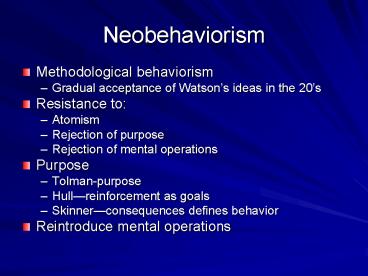Neobehaviorism - PowerPoint PPT Presentation
1 / 19
Title:
Neobehaviorism
Description:
'The body of scientific propositions exhausts the sum of all meaningful ... Project Pigeon. Teaching Machines. Walden Two. Functional analysis. Dissertation ... – PowerPoint PPT presentation
Number of Views:1531
Avg rating:3.0/5.0
Title: Neobehaviorism
1
Neobehaviorism
- Methodological behaviorism
- Gradual acceptance of Watsons ideas in the 20s
- Resistance to
- Atomism
- Rejection of purpose
- Rejection of mental operations
- Purpose
- Tolman-purpose
- Hullreinforcement as goals
- Skinnerconsequences defines behavior
- Reintroduce mental operations
2
Logical Positivism
- Logical positivism
- The body of scientific propositions exhausts the
sum of all meaningful statements. - Observation termsobservable properties
- Theoretical termsunobservable
- Meaningful only through operational definitions
- Operationism Percy W. Bridgman
- Concept operational definition
- Consistent with behaviorism
3
Neobehaviorism (ca. 19301960)
- Data animal learning
- Importance of experimentation
- Theory development and testing
- Explain observed behavior
- Positivism and operationism
4
Edwin Ray Guthrie (18861959)
- Learning based on contiguity
- "a combination of stimuli which has accompanied a
movement will on its recurrence tend to be
followed by that movement" - One trial learning
- Last movement in situation most strongly
associated - Last act produces success
- No reinforcement
- All or none no strengthening
- Actmany movements
- Movement produced stimuli
- Repetition produces better movements within act
5
Edward Chace Tolman (18861959)
- Roots
- Concern with purpose
- Gestalt psychology
- Purposive Behavior in Animals and Men (1932)
- Mental states inferred from behavior
- Molar
- Behaviorpurposive, goal directed
- Observable aspect of behavior
- Consciousnessexploratory behavior
6
- Learn situationmeaning
- S-S learning
- Expectancies
- Expectancy confirmation strengthens learning
- Cognitive map
- Intervening variables between stimulus and
response - Initiating variables
- Demand variables (motives) and cognitive
variables (abilities such as perception and motor
skills) - Need systems and belief value motives
- Behavior spacescognitive maps
- Hypothetical constructs
- Learning theory
- Reward affects performance not learning
- Latent learning
- Learning expectancies
- Cognitive map
7
Cognitive Maps in Rats and Men
- Maze learningexplanations?
- Stimulus response
- Frequency or reinforcement
- Fieldcognitive map
- Experiments
- Latent learning
- Blodgett (1929)
- Vicarious trial and error
- Searching for the stimulus
- Hypothesis experiments
8
- Spatial orientation
- Strip versus broad maps
- Brain damage
- Inadequate environmental cues
- Over-learning
- Excessive motivation or frustration
- Regression, fixation, displacement of aggression
9
Clark Leonard Hull (18841952)
- Mechanistic
- Strictly behaviorist
- Interest in quantification and formalization
- Behavior designed to reduce need
- Hypotheticodeductive theory
- Axioms and hypotheses
- Self-correcting
- Intervening variables physiological
10
Hulls Behavior Equation
- Response probability
- Strength of behaviordrive and habit
- D drive, need
- Primary (innate) or secondary (learned)
- Reinforcement drive reduction
- Habit strength learning
- Between stimulus and response
- number of reinforced responses
- K incentive motivationreward quality/quantity
- Performance motivation
- V stimulus intensity dynamism
- I inhibition--fatigue
11
Hulls Influence
- Strengths
- Generated much research
- Reintroduced concepts of incentives and
motivation - Terminology accepted
- Weaknesses
- Postulatessingle study
- Vulnerable to disproof
- Theory not robust
- Students
- Kenneth Spence (19071967) k
- Neal E. Miller (19092002) imitation and learned
reinforcers - Orval Hobart Mowrer (19071982) two factor theory
12
B. F. Skinner (1904-1990)
- Influential
- Content of theories
- Researcher
- Polemicist
- Emphasis on application
- Project Pigeon
- Teaching Machines
- Walden Two
13
Functional analysis
- Dissertation
- Reflex correlation of stimulus and response
- Functional analysis
- Relationship between stimulus and response
- Empty organism
- Strictly inductive
- Anti-theory
- Darwin
- Variable behavior selected by consequences
14
Operant Conditioning
- Operant versus respondent
- Respondentreflexive
- Operants emitted alter environment
- Operant strength increases when reinforced
- Reinforcement defined by consequences
15
Conditioning
- Positive (presentation reinforcing) and negative
reinforcements (removal is reinforcing) - Primary and secondary reinforcement (learned
reinforcementtoken economies) - Schedules of reinforcement
- Fixed and variable interval
- Fixed and variable ratio
- Shaping
- Discriminative stimuli
- Punishment
- Verbal Behavior
16
Methodological
- Skinner boxoperant chamber
- Small n, high control designs
- Applications
- Teaching machines
- Air cribs
17
Behaviorism at Fifty
- Mentalistic explantions
- Homunculus
- Public and Private
- Not really different
- Self-descriptive behavior
- Origin
- Verbal community
- Difficulty of arranging contingencies for private
events - Conscious contents
- Perceiving is behaving instead of assuming we
begin with a tendency to recognize such an object
once it is found, it is simpler to assume that we
begin with a tendency to see it
18
- Mental way stations
- Behaviorism
- Direct action of situation on behavior
- Mental states as causes
- Still function of environment
- Methodological objections
- Incomplete causal sequences
- Inaccuracies in self-description
- Order of events
- Invented causes
19
Basic Features of Behaviorism
- Purposeprediction and control
- Method functional analysis
- Determinism
- Environmental control
- Evolution and reinforcement
- Selection by consequences
- Materialism
- Subject matterbehavior
- Organism changes
- Respondent and operant
- Rate of response
- Purposecontrolling variables
- Stimulus control of operant behavior
- Principles generalize



























